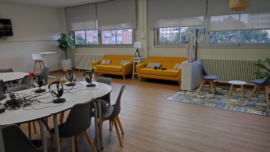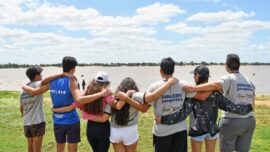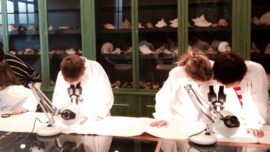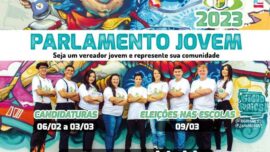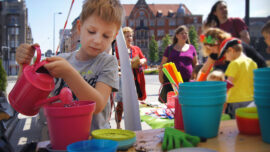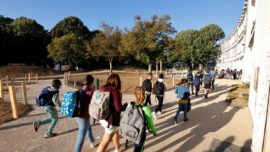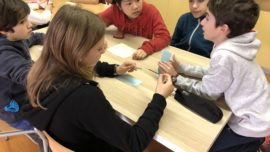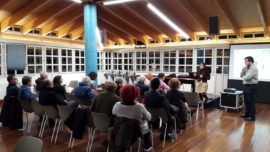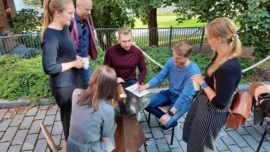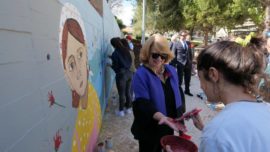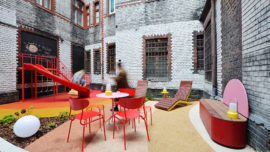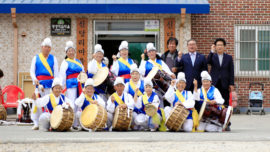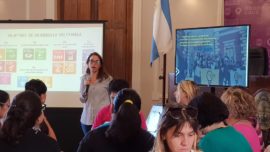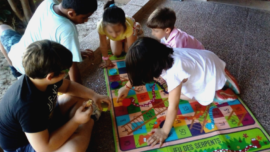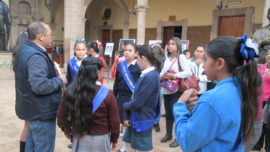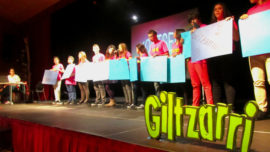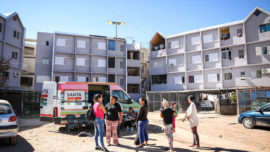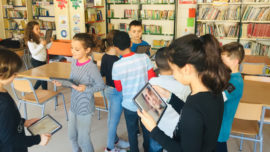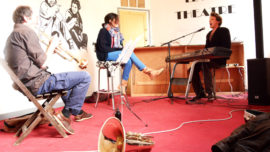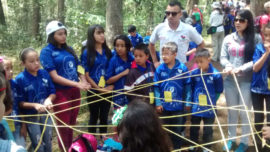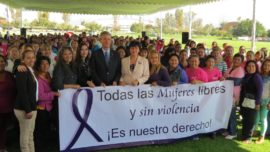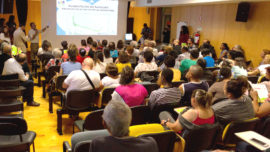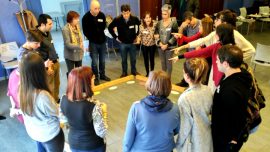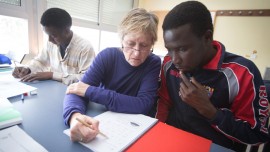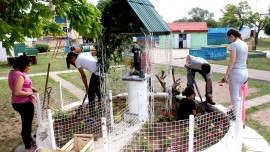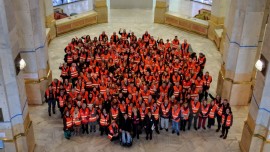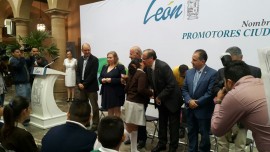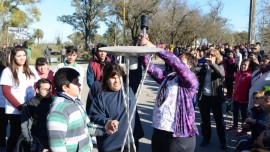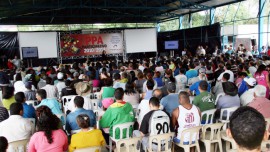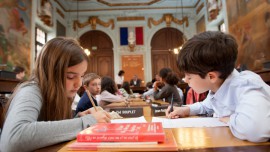Participation
The promotion of an active, critical and co-responsible citizenship is a key objective of the Educating Cities. That is why supporting skills for active participation; education in values and capacity building to promote grassroots movements becomes crucial in building better cities (articles 9 and 18 of the Charter of Educating Cities).
Experiences - News
New learning spaces: Smart Classroom
The SmartClassroom project transforms traditional classrooms into innovative spaces by integrating technology, environmental design, and active methodologies to enhance learning in primary schools across Viladecans. [...]
Youth Activities Coordinators
The project consists of organising groups of adolescents and young people from 13 to 25 years of age. It seeks to be a reference in the formation of citizens who play, reflect, propose and participate in an environment where they are valued and perceive themselves as agents of change. [...]
Biodiversity and Bioindication Research Group (BiBio)
BiBio is a research group, based at the Museum of Natural Sciences of Granollers (MCNG), that specialises in monitoring fauna and providing knowledge about the biodiversity. For this purpose, the group has developed a volunteer network with more than 1,000 people. [...]
Youth Parliament of Palmeira
The programmme operates as a parallel parliament, though it does not have legal power, and it enables young people to have the opportunity to analyse the demands of their municipality in a broader manner, while also considering possible ways to alleviate or find solutions to the problems in society. [...]
Local Initiative
Project based on the cooperation between the City Council and its citizens, the aim of which is the joint implementation of public tasks for the benefit of the local community. Residents submit their ideas and declare their participation in their implementation. [...]
Life Paths in the School Environment: children and their families at the heart of municipal education policies
A project to understand and improve the sequence of stages and milestones related to the schooling and education of boys and girls, taking into account the visions of families and children [...]
The Children Have Their Say. The Well-Being of Children in Barcelona
A programme with a threefold objective: to obtain a deep understanding of the well-being of children; to put children at the centre through participatory methodologies; and to contribute to the improvement of local public policies aimed at children and adolescents. [...]
Bilbao, City of Values
The project aims to position values as the driving forces behind human development in the city of Bilbao. [...]
Crowdfunding Tampere
The Crowdfunding Tampere project promotes the implementation of community-led social initiatives through a participatory funding model with financial support and technical advice from the municipality. [...]
COLAB. Collaborative laboratory in the neighbourhoods of Pescadores and Grito do Povo
The COLAB project is a territorially-based intervention that seeks to promote citizen participation and improve people’s quality of life, taking into account the educational potential of cultural activities. [...]
Pimp my yard
Pimp my Yard is a project that seeks to educate and raise social awareness among citizens. The project is based on social participation, community initiatives and responsible design. [...]
Welcome to S.A.M town (Sports, Art and Music program)
The ‘SAM village’ project, managed by the residents themselves, is a community that pursues self-fulfilment, social integration and autonomy in the creation of spaces for learning. [...]
Legislative Volunteering: citizen engagement in public policymaking
Legislative Volunteering is a meeting space designed to engage citizens in the participatory co-construction of legislative initiatives that help solve important public issues. [...]
Co-ed Playgrounds
It consists of designing non-sexist spaces in schools and town squares for infant and primary schoolchildren, expanding the variety of games, based on equality criteria and with the active engagement of girls and boys. [...]
Child Ambassador for Prevention
The initiative was created with a view to encouraging student participation in fostering positive coexistence at schools, and also helping to prevent violence and improve the quality of life, through a contest to appoint the child ambassadors. [...]
The Giltzarri Participation Platform
This platform was set up as a space through which to channel the participation of the adolescent and youth population of the city, fostering self-leadership and co-responsibility, in order to break with the stereotyped negative image of young people. [...]
The Abre Plan at Rouillón and Seguí
A comprehensive intervention to improve the quality of life, social harmony and the safety of the citizens residing in neighbourhoods whose residential environment has deteriorated and where the social exclusion risk indicators are high. [...]
Educational Innovation Network
Schools, local administration, families and companies united to improve education through information and communication technologies. [...]
Hotel Pasteur
An innovative model of rehabilitation of a historic building with criteria of economic efficiency, citizen participation and adaptation to the changing needs of the community. [...]
Children and Youth Citizen Participation Nurseries
Training processes addressed to children, young people and their families are established in all the districts of the city in order to foster skills that help optimize democratic citizen participation, through social dialogue and community interaction, among others. [...]
Women Free of Violence Networks
Gender-violence prevention programme that promotes the empowerment of women, fostering their equality and citizen participation through the solidarity of women’s networks. [...]
Our Neighbourhood, Our City
A model of governance that promoted the empowerment and active involvement of the citizens to set in motion collective responses to the common problems identified in the Bela Vista neighbourhood. [...]
Citizens Open School
To build a citizenry committed to their community through training in the skills necessary for people to participate, publicizing channels of participation, and bringing the City Council closer to its citizens, in order for the latter to play an ever-greater leading role in municipal policies. [...]
Education Volunteers Program
Volunteers of various ages with different skills carry out one off or permanent support tasks (one trimester, full school year, etc.), providing guidance in educational environments with children, adolescents, families, students from adult training centres and from the special education centre. [...]
My Gift to the City
On 11 November, Río Cuarto celebrates the anniversary of its founding. For one month the citizenry is invited to present proposals for collaboration or make contributions in the form of gifts in order to embellish the city and improve its quality of life. [...]
Volunteers for Madrid
Residents form part of citizen participation projects designed and promoted by the Municipality in all areas (culture, sport, environment, health, social issues, etc.). [...]
Civic Promoters
Students at various educational levels became involved in fostering positive actions to care for public spaces, in order to contribute to the construction of a more orderly, cleaner, more sustainable and safer city. [...]
Educational Organization Panel
An initiative of local development centred on the exercising of participatory democracy and on the strengthening of collaborating networks, that consist in implementing numerous actions seeking to improve education in the city. [...]
Participative Multi-annual Plan (PPA)
Through this plan, that articulates the rest of city council actions plans, a dialogue has been opened with the citizens with the aim of jointly thinking the issues that affect the lives of everyone. [...]
The Children’s Municipal Council
This Council was created in order to stir children’s interest in participating in the life of the city and to contribute to their education as citizens. [...]

